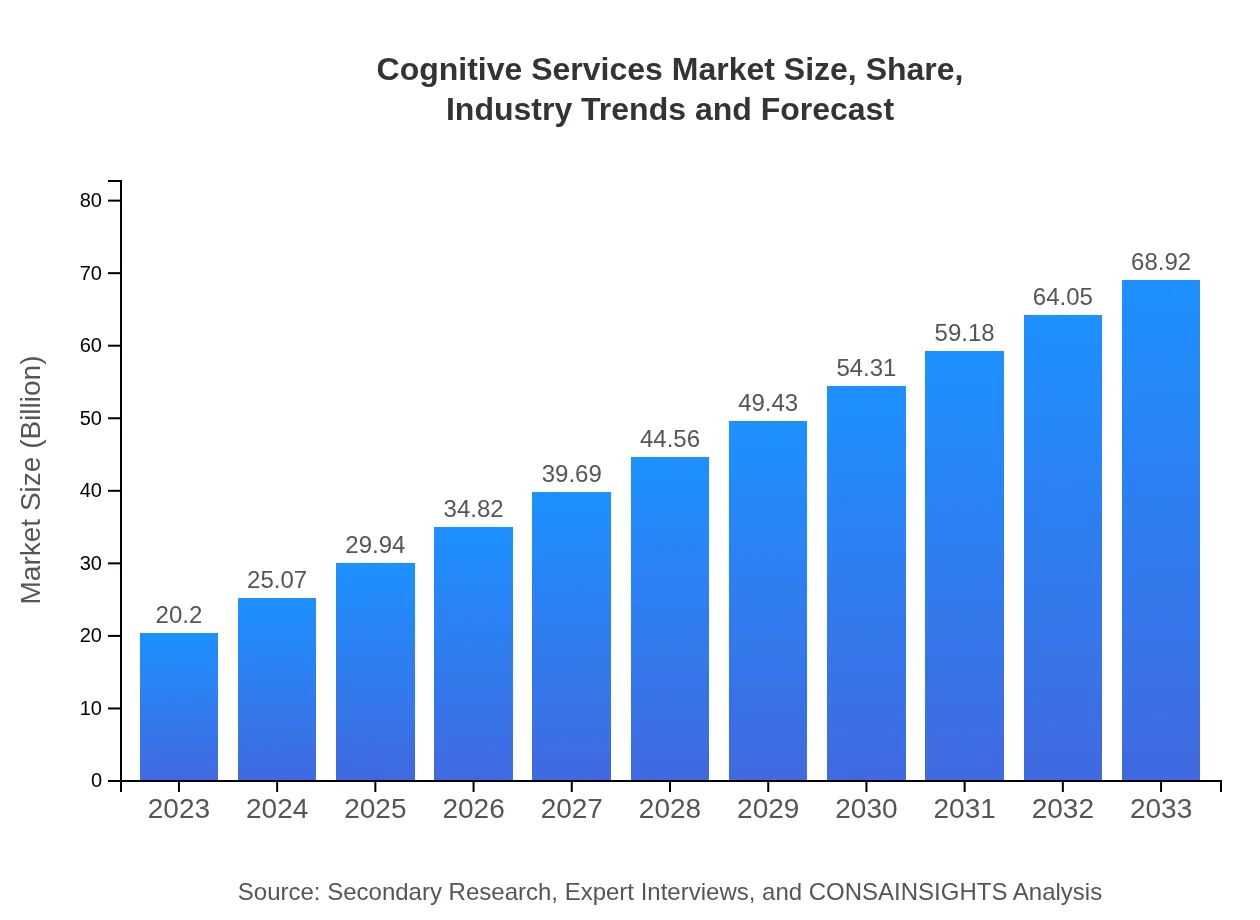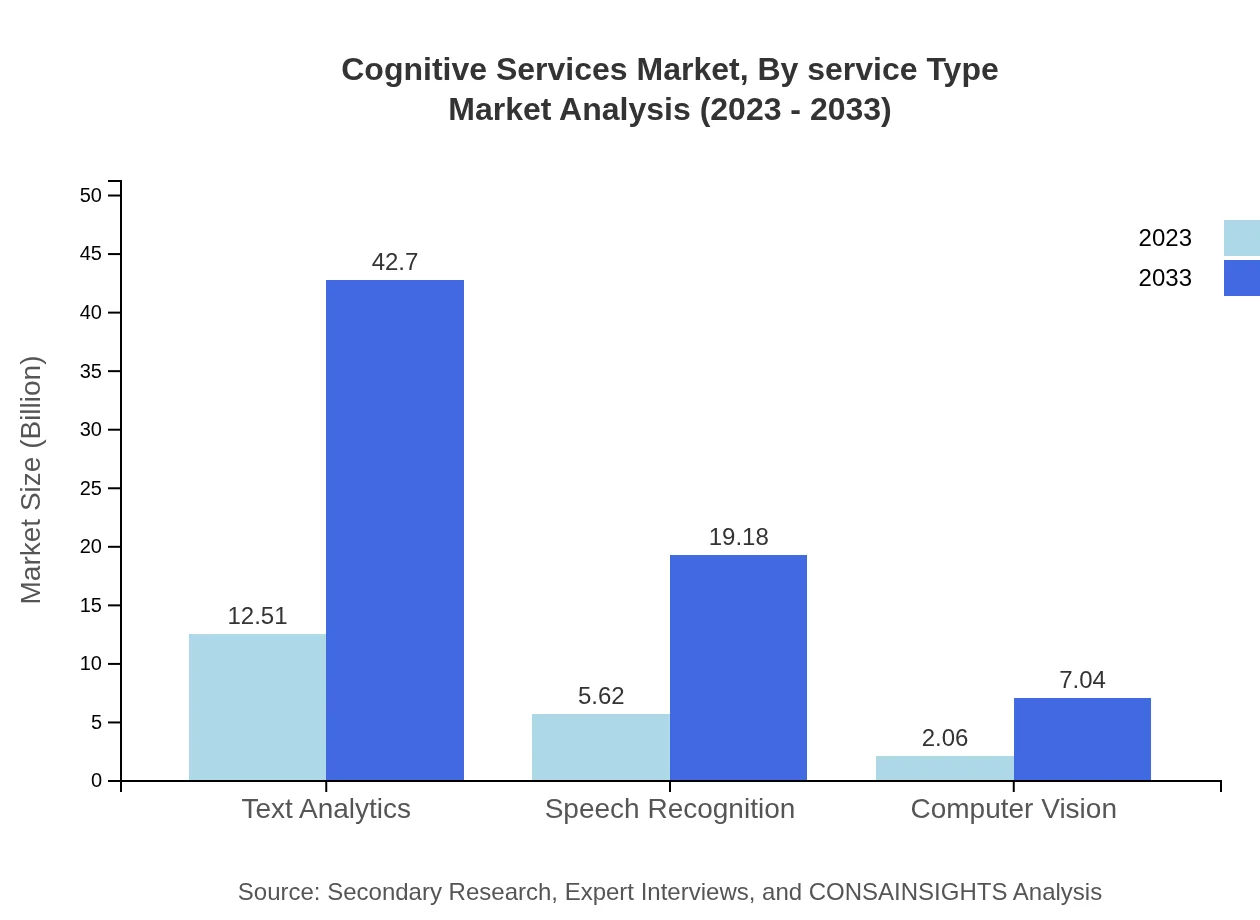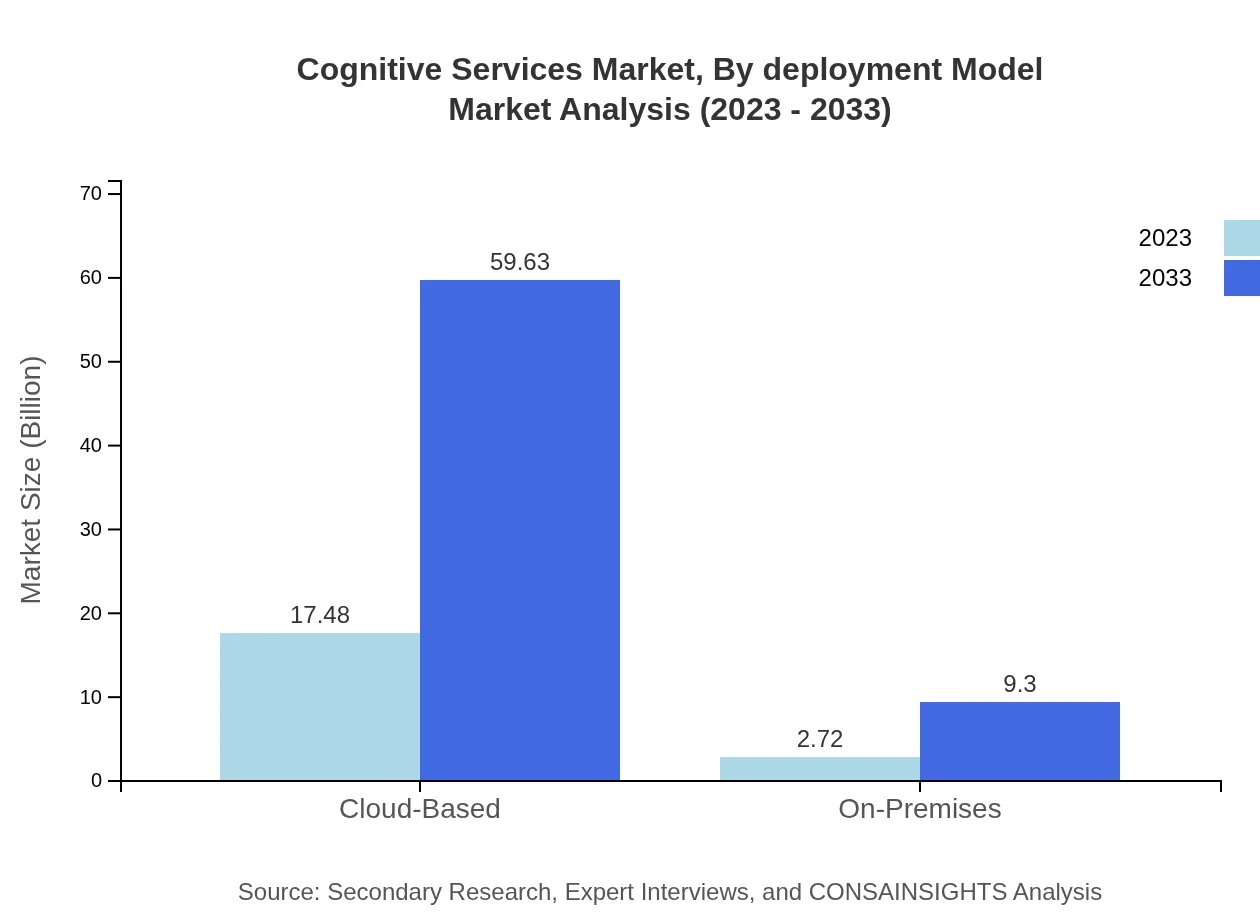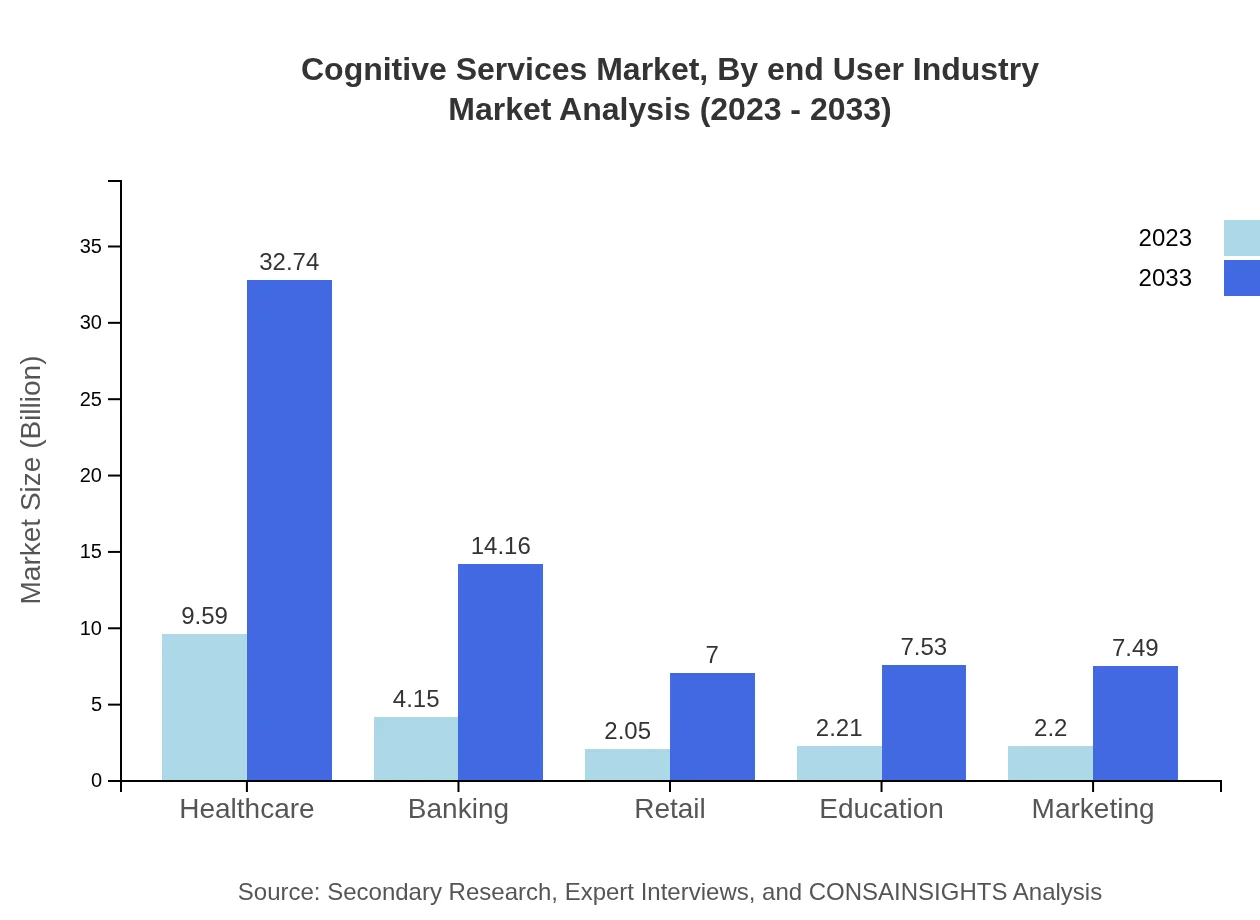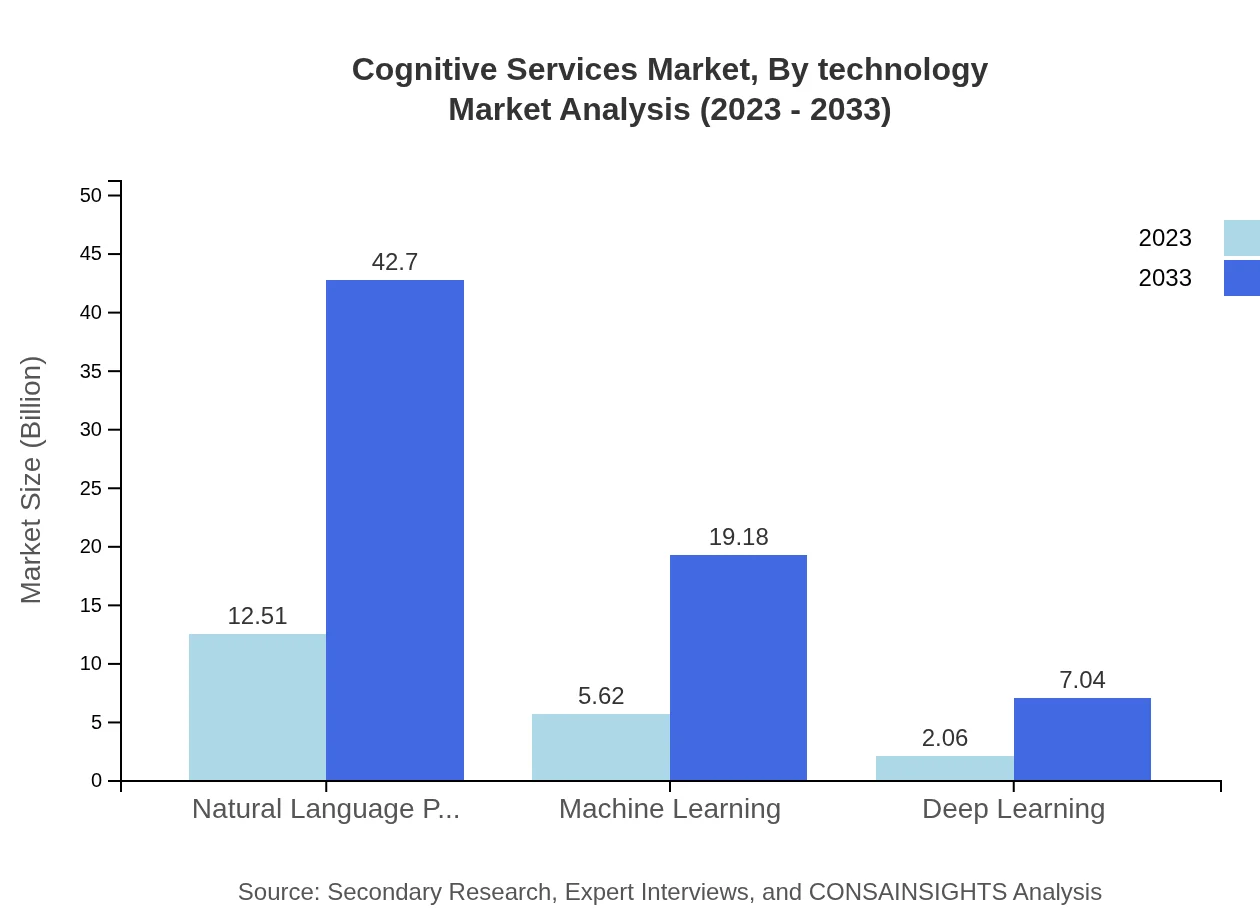Cognitive Services Market Report
Published Date: 31 January 2026 | Report Code: cognitive-services
Cognitive Services Market Size, Share, Industry Trends and Forecast to 2033
This report delves into the Cognitive Services market, examining key insights, data, market trends, and forecasts from 2023 to 2033, focusing on growth drivers, challenges, and segmentation.
| Metric | Value |
|---|---|
| Study Period | 2023 - 2033 |
| 2023 Market Size | $20.20 Billion |
| CAGR (2023-2033) | 12.5% |
| 2033 Market Size | $68.92 Billion |
| Top Companies | Microsoft Corp., IBM Corporation, Google LLC, Amazon Web Services (AWS), Salesforce |
| Last Modified Date | 31 January 2026 |
Cognitive Services Market Overview
Customize Cognitive Services Market Report market research report
- ✔ Get in-depth analysis of Cognitive Services market size, growth, and forecasts.
- ✔ Understand Cognitive Services's regional dynamics and industry-specific trends.
- ✔ Identify potential applications, end-user demand, and growth segments in Cognitive Services
What is the Market Size & CAGR of Cognitive Services market in 2023?
Cognitive Services Industry Analysis
Cognitive Services Market Segmentation and Scope
Tell us your focus area and get a customized research report.
Cognitive Services Market Analysis Report by Region
Europe Cognitive Services Market Report:
In Europe, the market for Cognitive Services stands at $5.47 billion in 2023 and is anticipated to soar to $18.65 billion by 2033. The European Union's focus on AI ethics and regulations, along with investments in innovative technologies, contribute to this growth.Asia Pacific Cognitive Services Market Report:
In the Asia Pacific region, the Cognitive Services market is valued at $4.12 billion in 2023 and is expected to grow to $14.05 billion by 2033. Rapid adoption of AI technologies across industries in countries like China, Japan, and India, along with increased investments in cloud computing, are key drivers of this growth.North America Cognitive Services Market Report:
North America remains a leader in the Cognitive Services market, valued at $6.68 billion in 2023 and expected to hit $22.78 billion by 2033. Advances in technology and substantial investments from major tech players drive this dominant position.South America Cognitive Services Market Report:
South America shows a burgeoning interest in Cognitive Services, with the market size reaching $1.63 billion in 2023, projected to expand to $5.55 billion by 2033. The growth is fueled by digital transformation efforts across major sectors, particularly retail and education.Middle East & Africa Cognitive Services Market Report:
The Middle East and Africa market for Cognitive Services is projected to grow from $2.31 billion in 2023 to $7.90 billion by 2033. The increasing incorporation of AI in government services and financial sectors highlights its potential in the region.Tell us your focus area and get a customized research report.
Cognitive Services Market Analysis By Service Type
Natural Language Processing offers a significant market size of $12.51 billion in 2023, projected to leap to $42.70 billion by 2033, showcasing its dominant share of 61.95%. Additionally, Machine Learning is set to grow from $5.62 billion to $19.18 billion, reflecting an increasing share of 27.83%. Deep Learning and Text Analytics are also crucial, contributing respective sizes of $2.06 billion and $12.51 billion in 2023.
Cognitive Services Market Analysis By Deployment Model
The Cognitive Services market, when analyzed by deployment model, reveals Cloud-based solutions dominating with a size of $17.48 billion in 2023, expected to rise to $59.63 billion by 2033. On-Premises solutions are currently valued at $2.72 billion and forecasted to grow to $9.30 billion. Cloud solutions account for an impressive 86.51% market share in this segment, indicating a clear preference for scalable, accessible platforms.
Cognitive Services Market Analysis By End User Industry
In the healthcare sector, Cognitive Services represent a market size of $9.59 billion in 2023, anticipated to reach $32.74 billion by 2033, highlighting a share of 47.5%. Other significant contributors include Banking at $4.15 billion, expected to grow to $14.16 billion, and Retail with $2.05 billion, poised to increase to $7.00 billion, showcasing the technology's broad applicability across industries.
Cognitive Services Market Analysis By Technology
The technology segment of Cognitive Services comprises various influential categories. Natural Language Processing remains the largest segment, while Machine Learning and Deep Learning also play pivotal roles. Considerable growth is expected as enterprises increasingly deploy these technologies to drive operational efficiencies and enhance customer interactions.
Cognitive Services Market Trends and Future Forecast
Tell us your focus area and get a customized research report.
Global Market Leaders and Top Companies in Cognitive Services Industry
Microsoft Corp.:
A pioneer in cloud-based cognitive services, Microsoft's Azure Cognitive Services offers a comprehensive suite for AI implementation, including NLP, Machine Learning, and custom AI solutions.IBM Corporation:
IBM Watson leads in the AI space, providing businesses with tools for leveraging cognitive data analytics and automation tailored to various industries.Google LLC:
As a leader in AI and machine learning, Google's Cognitive Services focus on text analytics and natural language processing, supporting businesses in enhancing user engagement.Amazon Web Services (AWS):
AWS offers an extensive range of cognitive services, emphasizing scalability and integration with existing applications to facilitate AI-driven innovations.Salesforce:
Salesforce's Einstein AI and other cognitive capabilities help businesses automate processes and create personalized marketing strategies.We're grateful to work with incredible clients.









FAQs
What is the market size of cognitive Services?
The cognitive services market is valued at approximately $20.2 billion in 2023 and is projected to grow at a CAGR of 12.5%, reaching significant expansion by 2033.
What are the key market players or companies in this cognitive Services industry?
Key players include major technology companies like Microsoft, IBM, Amazon, and Google. These companies are recognized for their advanced capabilities in AI-driven cognitive services, influencing market dynamics and innovation.
What are the primary factors driving the growth in the cognitive services industry?
Factors such as increased demand for AI solutions, advancements in natural language processing, and the integration of machine learning across business sectors are driving growth in the cognitive services industry.
Which region is the fastest Growing in the cognitive services market?
North America is the fastest-growing region, with market expansion from $6.68 billion in 2023 to $22.78 billion by 2033, driven by significant investment in AI technologies and a robust IT infrastructure.
Does ConsaInsights provide customized market report data for the cognitive Services industry?
Yes, ConsaInsights offers customized market report data tailored to specific needs within the cognitive services industry, helping clients make informed decisions.
What deliverables can I expect from this cognitive Services market research project?
Expect comprehensive reports detailing market trends, competitive analysis, regional insights, and segment evaluation within the cognitive services market.
What are the market trends of cognitive Services?
Growing adoption of cloud-based solutions (projected market size: $59.63 billion by 2033) and advancements in natural language processing (expected to reach $42.70 billion) are key trends shaping the cognitive services market.

